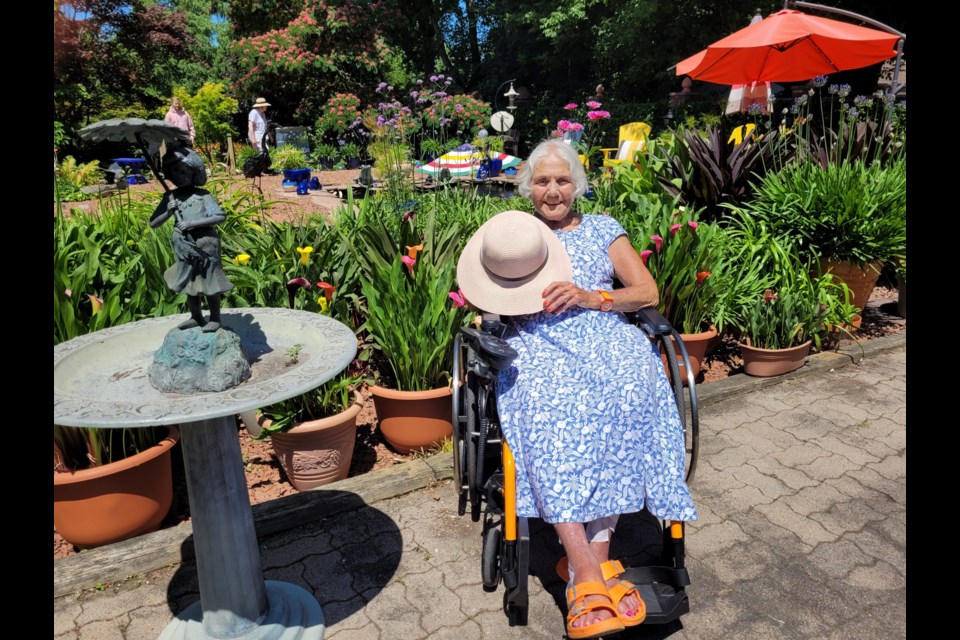Sheila Hirsch-Kalm thrives on sharing her passion for gardening and extensive knowledge with others.
So despite her continuing battle against a progressing blood cancer, one she was diagnosed with more than 20 years ago and has received active treatment for ever since, she couldn’t miss being part of this year’s Niagara-on-the-Lake Horticultural Society’s garden tour.
Hirsch-Kalm, an honorary life-time member of the horticultural society, is best-known in town for the indomitable spirit and enthusiasm she has shown since the first Daffodil Garden of Hope was planted in Simcoe Park in 2005, now numbering nine across town, the most recent one in St. Davids.
The daffodils were intended as a symbol of hope when they bloom in the spring, as they still are, for all those affected by cancer, and as a reminder of the importance of cancer awareness.
Greeting garden tour visitors to her back garden Saturday afternoon, Hirsch-Kalm, who has relied on a walker for years due to a complication with cancer, was in a wheelchair, due to the progression of the disease. But that doesn’t dampen her enthusiasm. Her walker isn’t far away, and she can still get around on it, although her first-in-Canada, ultra-sophisticated titanium wheelchair makes mobility easier for her. She still drives, she is proud to say, having passed her third driving test since she turned 80 — she is now 86 — and has a special “robotic arm” device attached to the back of her car that brings the battery-operated chair around to her when she gets out of the car, and replaces it in the back when she gets in to drive.
“If we lose our ability to drive, there is no way to get around this town,” she says. “That is worrying for a lot of people who are afraid of losing their mobility.”
Hirsch-Kalm has represented the town on a regional accessibility committee, but is disappointed in the lack of action over the years, she says.
However, as she learns to live with her mobility limitations, she is also learning to garden with them.
Much of the large acreage around the York Road home where she and her husband Michael live is graced with a multitude of plants of all sizes and varieties. Sheila says she is concentrating on “transitioning” to container gardening to reduce maintenance and make it easier for her to care for them herself.
She is able to keep her plants healthy, weed- and bug-free, she says, in the containers she has filled with a wide variety of plants, looking for interesting colours and textures. Against the house is a large worktable for her, where she can fill the containers to be placed around the garden.
“I can sit in my chair, hose in one hand and a glass of wine in the other, and water them,” she says, her arm sweeping across a wide expanse of a selection of plants in containers.
“If I can transition, I can teach other people to as well. I hope I can help others to keep going as long as I have.”
She suggests people who are caring for elderly family members might consider doing the same, to give them the opportunity to continue gardening.
Days like Saturday, when people come to see her and her garden, are her greatest pleasure, she says.
She loves to chat, always has interesting stories to tell, and it’s not only the horticultural society tour that delivers people to her garden. She was expecting another group from Toronto on Sunday, and two more this coming weekend. The Toronto branch of the Rhododendron Association never misses an opportunity to visit.
“I really enjoy those visits — it’s what keeps me going, keeps me in touch with people and with life.”
Cindy Grant, the organizer of this year’s garden tour, explains the format was a little different, allowing for more gardens than usual. This year, the host society asked residents to submit their gardens to be part of the tour, which was offered at no cost. That resulted in 25 gardens on the map, most in the Old Town, but Hirsch-Kalm’s was one of a three on the tour in St. Davids.
Although hers has been on previous tours, the home of Wendy and Paul Kent on Queenston Road was a first. Paul says a few years ago he fulfilled one of the items on his bucket list, to have English gardens planted around the large property, and having achieved that, he was happy to open them up to the public.
Tour participants were asked to pick up bracelets and maps at the community centre before heading out to the gardens, and Grant says there were more than 700 people on the tour, a little less than previous years but still a great day.
“We keep hearing from people who are telling us ‘it’s the best tour ever,’ she says. “They really liked the format, and the variety of gardens.”
One local participant spoke of it as “a gift,” and a “sheer delight” to wander from one garden to another “never knowing what to expect, other than something beautiful,” with gardens both designed and maintained by the owner and those professionally done.
Although there was no cost for the tour, there were donation jars at each garden, “and there was a significant amount of donations,” says Grant.
The organizers are grateful to those who shared their gardens, says Grant, and although the format was only intended to be for this year, “we’ll have to talk about it and decide what we want to do next year.”
There was a wide variety of plants and garden designs in several Old Town gardens on this year’s tour. (Karen Skeoch)



